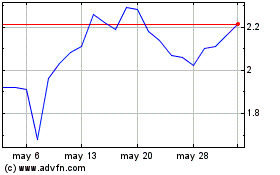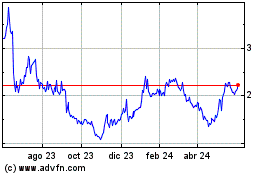Corvus Pharmaceuticals Initiates Registrational Phase 3 Clinical Trial of Soquelitinib for Patients with Relapsed/Refractory Peripheral T-Cell Lymphoma
10 Septiembre 2024 - 7:30AM

Corvus Pharmaceuticals, Inc. (NASDAQ: CRVS), a clinical-stage
biopharmaceutical company, today announced that it has initiated a
registrational Phase 3 clinical trial of soquelitinib for patients
with relapsed/refractory peripheral T-cell lymphoma (PTCL). The
clinical trial is a randomized, controlled study that will evaluate
the efficacy and safety of soquelitinib compared to standard of
care chemotherapy.
"The initiation of the soquelitinib Phase 3 trial for relapsed
PTCL is an important milestone for Corvus and for patients
suffering with this disease," said Richard A. Miller, M.D.,
co-founder, president and chief executive officer of Corvus.
"Soquelitinib has a unique mechanism of action based on selective
ITK inhibition, which we believe has potential for the treatment of
T cell lymphomas, as well as for solid tumors and a broad range of
immune diseases.”
The clinical trial (NCT06561048) is designed to enroll
approximately 150 patients with relapsed/refractory PTCL who have
failed one to three prior lines of therapy. Patients will be
randomized in a 1:1 ratio to receive either 200mg dose of
soquelitinib two-times a day or standard of care chemotherapy with
either belinostat or pralatrexate. The primary endpoint of the
clinical trial is progression-free survival and secondary endpoints
include overall survival, objective response rate, and duration of
response. The trial is expected to enroll patients at approximately
40 sites in the United States, Canada, Australia and South
Korea.
"We are excited to participate in this Phase 3 trial evaluating
a new therapy for patients with relapsed/refractory PTCL," said
Swaminathan P. Iyer, M.D., principal investigator of the study and
Professor in the Department of Lymphoma and Myeloma at The
University of Texas MD Anderson Cancer Center. "In earlier stage
trials, soquelitinib has been well-tolerated and has demonstrated
durable anti-tumor activity in patients with very advanced disease.
Soquelitinib’s novel mechanism of action results in enhancement of
the host anti-tumor response. In general, chemotherapy drugs have
not produced lasting remissions and are sometimes associated with
significant toxicity. There has been a scarcity of new ideas for
the treatment of PTCL and we are eager to see if soquelitinib can
offer these patients a more effective and safer treatment."
About Corvus PharmaceuticalsCorvus
Pharmaceuticals is a clinical-stage biopharmaceutical company
pioneering the development of ITK inhibition as a new approach to
immunotherapy for a broad range of cancer and immune diseases. The
Company’s lead product candidate is soquelitinib, an
investigational, oral, small molecule drug that selectively
inhibits ITK. Its other clinical-stage candidates are being
developed for a variety of cancer indications. For more
information, visit www.corvuspharma.com.
About Peripheral T Cell LymphomaPeripheral T
cell lymphoma (PTCL) is a heterogeneous group of malignancies
accounting for about 10% of non-Hodgkin’s lymphomas (NHL) in
western populations, reaching 20% to 25% of NHL in some parts of
Asia and South America. The most common subtypes are PTCL-not
otherwise specified (PTCL-NOS) and T follicular helper cell
lymphoma. Initial therapy for these diseases is typically
combination chemotherapy, however, approximately 75% of patients
either do not respond or relapse within the first two years.
Patients in relapse are treated with various chemotherapy agents
but have poor overall outcomes with median progression-free
survival in the 3 to 4 month range and overall median survival of 6
to 12 months. There are no approved drugs in relapsed PTCL based on
randomized trials.
PTCL is a disease of mature helper T cells that express ITK,
often containing numerous genetic mutations and frequently
associated with viral infection. Most often the malignant cells of
PTCL express a Th2 phenotype.
About SoquelitinibSoquelitinib (formerly
CPI-818) is an investigational small molecule drug given orally
designed to selectively inhibit ITK (interleukin-2-inducible T cell
kinase), an enzyme that is expressed predominantly in T cells and
plays a role in T cell and natural killer (NK) cell immune
function. Based on interim results from a Phase 1/1b clinical trial
in patients with refractory T cell lymphomas, which demonstrated
tumor responses in very advanced, refractory, difficult to treat T
cell malignancies, the Company has initiated a registrational Phase
3 clinical trial (NCT06561048) of soquelitinib in patients with
relapsed PTCL. Soquelitinib is also now being investigated in a
randomized placebo controlled phase 1 clinical trial in patients
with atopic dermatitis. The immunologic effects of soquelitinib
lead to what is known as Th1 skewing and inhibition of Th2 and Th17
cells. Research on soquelitinib’s mechanism of action suggests that
it has the potential to control differentiation of normal T helper
cells and enhance immune responses to tumors by augmenting the
generation of cytotoxic killer T cells and the production of
cytokines that inhibit cancer cell survival. Soquelitinib has also
been shown to prevent T cell exhaustion, a major limitation of
current immunotherapy and CAR-T therapies. Soquelitinib has been
shown to affect T cell differentiation and induce the generation of
Th1 helper cells while blocking the development of both Th2 and
Th17 cells and production of their secreted cytokines. Th1 T cells
are required for immunity to tumors, viral infections and other
infectious diseases. Th2 and Th17 helper T cells are involved in
the pathogenesis of many autoimmune and allergic diseases. The
Company believes the inhibition of specific molecular targets in T
cells may be of therapeutic benefit for patients with cancers,
including solid tumors, and in patients with autoimmune and
allergic diseases.
Forward-Looking StatementsThis press release
contains forward-looking statements, including statements related
to the potential safety and efficacy of the Company’s product
candidates including soquelitinib; the potential use of
soquelitinib to treat PTCL, solid tumors and a broad range of
autoimmune diseases; the Company’s ability and its partners’
ability, as well as the timing thereof, to develop and advance
product candidates into and successfully complete preclinical
studies and clinical trials, including the Company’s Phase 3
clinical trial for PTCL with soquelitinib; and the design of
clinical trials, including the target or expected number of
patients to be enrolled, expected number of sites and certain other
product development milestones, including in regards to the Phase 3
clinical trial for PTCL with soquelitinib. All statements other
than statements of historical fact contained in this press release
are forward-looking statements. These statements often include
words such as “believe,” “expect,” “anticipate,” “intend,” “plan,”
“estimate,” “seek,” “will,” “may” or similar expressions.
Forward-looking statements are subject to a number of risks and
uncertainties, many of which involve factors or circumstances that
are beyond the Company’s control. The Company’s actual results
could differ materially from those stated or implied in
forward-looking statements due to a number of factors, including
but not limited to, risks detailed in the Company’s Quarterly
Report on Form 10-Q for the three months ended June 30, 2024,
filed with the Securities and Exchange Commission on
August 6, 2024, as well as other documents that may be filed by the
Company from time to time with the Securities and Exchange
Commission. In particular, the following factors, among others,
could cause results to differ materially from those expressed or
implied by such forward-looking statements: the Company’s ability
to demonstrate sufficient evidence of efficacy and safety in its
clinical trials of soquelitinib and its other product candidates;
the accuracy of the Company’s estimates relating to its ability to
initiate and/or complete preclinical studies and clinical trials
and release data from such studies and clinical trials; the results
of preclinical studies and interim data from clinical trials not
being predictive of future results; the Company’s ability to enroll
sufficient numbers of patients in its clinical trials; the
unpredictability of the regulatory process; regulatory developments
in the United States, and other foreign countries; the costs
of clinical trials may exceed expectations; and the Company’s
ability to raise additional capital. Although the Company believes
that the expectations reflected in the forward-looking statements
are reasonable, it cannot guarantee that the events and
circumstances reflected in the forward-looking statements will be
achieved or occur, and the timing of events and circumstances and
actual results could differ materially from those projected in the
forward-looking statements. Accordingly, you should not place undue
reliance on these forward-looking statements. All such statements
speak only as of the date made, and the Company undertakes no
obligation to update or revise publicly any forward-looking
statements, whether as a result of new information, future events
or otherwise.
INVESTOR CONTACT:Leiv LeaChief Financial
OfficerCorvus Pharmaceuticals,
Inc.+1-650-900-4522llea@corvuspharma.com
MEDIA CONTACT:Sheryl SeapyReal
Chemistry+1-949-903-4750sseapy@realchemistry.com
Corvus Pharmaceuticals (NASDAQ:CRVS)
Gráfica de Acción Histórica
De Ago 2024 a Sep 2024

Corvus Pharmaceuticals (NASDAQ:CRVS)
Gráfica de Acción Histórica
De Sep 2023 a Sep 2024
